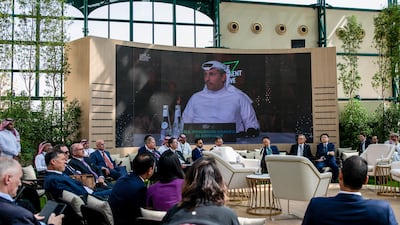Many of the global energy supply challenges are the result of under-investment in oil and gas infrastructure, while Russia’s war in Ukraine and the coronavirus pandemic have been catalysts in amplifying those problems, the Future Investment Initiative heard on Tuesday.
The energy crisis existed before “black swan events that impacted every country”, however, among the root causes of the crisis was the inability of financiers, investment institutions and many of the energy companies to invest, Khaldoon Al Mubarak, managing director and chief executive of Mubadala Investment Company, told the forum in Riyadh.
Such investment would have helped to alleviate "a big part of the problem we're dealing with today”, he told delegates at a panel discussion.
The so-called cancel culture in its push to speed up energy transition curtailed investments in the sector, consequences of which are visible in form of the energy supply challenges.
“Three years ago, in this country, if you were at this conference, the word hydrocarbon was just, you know, evil,” he said.
“I feel strongly that the climate challenge is the biggest challenge” but the energy transition is taking place and hydrocarbons are part of the solution, he said.
Mr Al Mubarak’s comments were echoed by Indian billionaire Mukesh Ambani, who said “supplies of ample and affordable conventional energy are still required over the long term”.
Reliance is “busy” setting up the “the world’s most integrated” complex of new energy giga-factories in Jamnagar, in the western Indian state of Gujarat, Mr Ambani, chairman of Indian conglomerate Reliance Industries, said in a pre-recorded video address at the FII.
“This will provide supply security, unparalleled cost advantage and the ability to capture chain margins with maximum recycling,” he said.
“Reliance will also invest in energy storage systems to complement solar power generation."
Maintaining investment in oil and gas is critical for energy security and economic progress as current market dynamics do not reflect underlying fundamentals and long-term demand growth, Dr Sultan Al Jaber, Minister of Industry and Advanced Technology, said at the Energy Intelligence Forum in London earlier this month.
The global oil and gas industry requires more than $600 billion of investment annually to keep up with the growing demand for energy, even as the world transitions to cleaner forms of energy, Dr Al Jaber, who is also group chief executive of Abu Dhabi National Oil Company, said last year.
In May, energy ministers of the UAE and Saudi Arabia also called for increased investment in the industry and collective action amid supply concerns due to Russia’s war in Ukraine.
_________________________
Saudi Arabia's Future Investment Initiative 2022 - in pictures
_________________________
Oil and gas will account for more than 50 per cent of the global energy mix by 2045 and will continue to play an important role, even as the world pivots towards cleaner forms of energy, Opec's late secretary general Mohammad Barkindo said in March.
Opec countries produce about 40 per cent of the world's crude oil.
Mr Al Mubarak said the effect of the “anomalous black swan” events was remarkable and the world was still coming to grips with repercussions.
“[We] cannot deny we are in a very difficult crisis from a global perspective,” he said.
“In my view, it takes, on many occasions, a crisis to work yourself out of it, and to start resetting some of the issues that created the crisis to start with."
Whether the world economy goes into a recession or not, from a global perspective a reset is absolutely necessary, and “I think it’s going to be happening within the next 12 to 24 months”, he added.
From the policy perspective, governments need to be “more practical to start with”, in a bid to better manage the current headwinds, Yasir Al Rumayyan, governor of the kingdom’s sovereign wealth fund, Public Investment Fund, told delegates.
“The difference between corporations and governments most of the time is that corporations to large extents, use data, information, analysis to come to [a] conclusion.
“The problem that I see most of the time with most of the governments is they're starting with a certain ideology and this ideology will come to a final recommendation and then they will work back.
“What I'm trying to say here, the more practical we are at addressing the problems that we have, we can have the right solutions.”
Domestically, the PIF, which manages more than $620bn in assets and invests on behalf of the kingdom, is following its mandate to plunge $40bn to $50bn annually into Saudi Arabia's economy.
The fund is "looking at its bottom line … looking at the economic multiplier, what good these projects will do to the economy [and] what kind of jobs it will create”, Mr Al Rumayyan added.






























